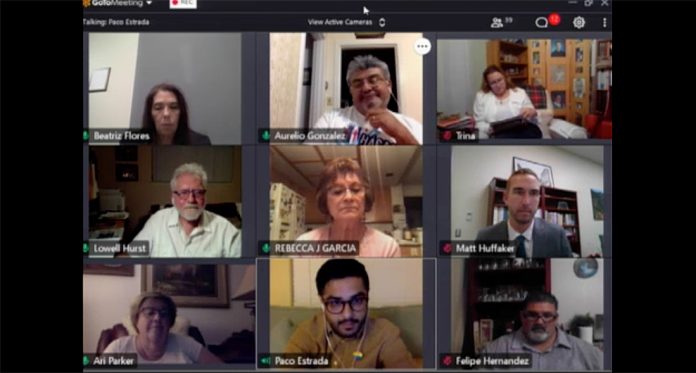
WATSONVILLE—What was anticipated to be a fight to save the city’s youth sports programs on Tuesday instead turned into a community call to slice into Watsonville Police Department’s $21 million budget in order to fund youth enrichment programs and social services.
The Watsonville City Council approved the budget for fiscal year 2020/21 but not before roughly two dozen members of the community urged leaders to reimagine the way they allocate public funds, echoing nationwide calls to defund the police and reinvest in the community.
The majority of the council agreed that conversations around the police department’s budget needed to continue, but none proposed changes to the budget that was presented by staff.
It was approved 6-1. Councilman Francisco “Paco” Estrada was the lone “no” vote. He thanked staff for their work on the budget, but said he was taking a “leap of faith” with the community.
“I’m willing to put in the work to help build a budget that reflects what they want moving forward,” he said.
Two weeks after staff proposed a budget that defunded the city’s sports division because of countywide shelter-in-place restrictions, Finance Department Director Cindy Czerwin returned with an updated budget that included roughly $194,000 of funding for youth sports programs—the majority of which will go toward staffing.
That amendment was not enough for community members who called into the virtual meeting and waited deep into the night to voice their opinions on the shoestring budget. The proposed budget was trimmed by roughly $4.3 million to make up for mass revenue and sales tax loss as a result of the Covid-19 pandemic.
At the top of those callers’ concerns: WPD taking 46% of the city’s roughly $40 million general fund. They argued that some of that cash should be redistributed to the Public Works and Parks and Community Services departments, which combined are roughly 11% of the city’s general fund. Another chunk, they said, should go to supporting nonprofits that provide various community services.
Community Bridges CEO Raymon Cancino led that push, citing a 2018 study done by New York University, the Brennan Center For Justice and the New York Times that found that crime rates drop as nonprofits multiply in communities.
“The more you invest in social services, the better off you are,” Cancio said. “It’s critically important that people consider that and understand the impacts that we have of past decisions, current decisions and future decisions. And, also, why investing in our youth is important, and why it should be a top priority for our council to continue the trend that we’ve been on, which is reduced crime rates.”
Watsonville Chief of Police David Honda agreed that WPD was disproportionately funded when compared to other city departments, but said that the funding was necessary in order for the department to meet its ever-growing list of responsibilities.
On top of everyday policing, WPD has had to respond to increased calls dealing with mental health and homelessness issues. Those tasks have required additional training for his officers, and have led to further financial investments in programs such as the Crisis Assessment Response and Engagement team, which pairs officers with social workers that specialize in mental health crises.
Honda said his department has also used its funding to stabilize and expand youth programs such the Police Activities League and the Caminos Hacia el Exito program, which works with first-time youth offenders to keep them out of the criminal justice system.
“I’m not saying there’s not a better way to [serve the city’s at-risk young people],” he said. “[The Caminos program has] been a very successful program, but I’m open to any suggestions. I’d like to expand that program to where we can reach even more of our youth.”
Honda also said that Watsonville’s crime rates have dropped over the last four years.
Roughly 80% of WPD’s budget is tabbed for staff. Cuts to the department most likely would have resulted in a reduction of officers and increased overtime spending, something the department struggled with before the passing of Measure G—the half-cent sales tax passed by voters in 2016 that provided additional funding for the city’s police and fire departments.
Measure Y, approved by Watsonville voters in March, will take Measure G’s place and will provide increased funding for the Parks and Community Services department on top of the police and fire departments. But community members were not happy with the distribution of funds from the sales tax (police: 54%, fire: 38%, parks: 8%), saying that more should be redistributed to programs for young people.
Estrada reminded people that Measure Y can be repealed by voters.
“If Measure Y was not the right measure for Watsonville, it can be repealed and it can be brought back to the voters in a better way—a better deal for the community,” he said. “If you want any change, you have to vote too…. ultimately when you don’t vote, you let other people in the community vote for you.”
Watsonville City Manager Matt Huffaker said WPD is organizing community forums led by social service groups to gather ideas of how the department can continue to improve. It will return to the council with some options in the near future.
“I think it’s really a conversation that we need to have with our community, as we develop options in what we want our police department to be about and prioritize based on our specific community needs,” Huffaker said.
The final budget eliminated the Parks and Community Services’ Special Events division and made cuts—including two layoffs—to the Community Development Department. Special Events was slashed because the city believes large gatherings will be outlawed for the foreseeable future. The cuts to CDD, staff said, were a result of lowered demand for services.
In all, the city trimmed roughly $3 million in salaries and benefits, and saved another $1.3 million from its general fund by trimming its discretionary spending and reallocating its special revenue funds. It made up the remaining $2.2 million from its projected $6.5 million deficit by using half of its emergency funds.
It is still unclear when—or if—youth sports will be allowed to resume, and what they might look like. The city could also eventually offer adult sports if the state and county continue loosening restrictions put in place to slow Covid-19.
Czerwin will return to the council with a budget update in August when the city will have a better picture of its property and sales tax numbers. She will then return in November and again in February with additional updates. The council can make adjustments when available, she said.
“We’re going to have to be very fluid this year,” she said.











